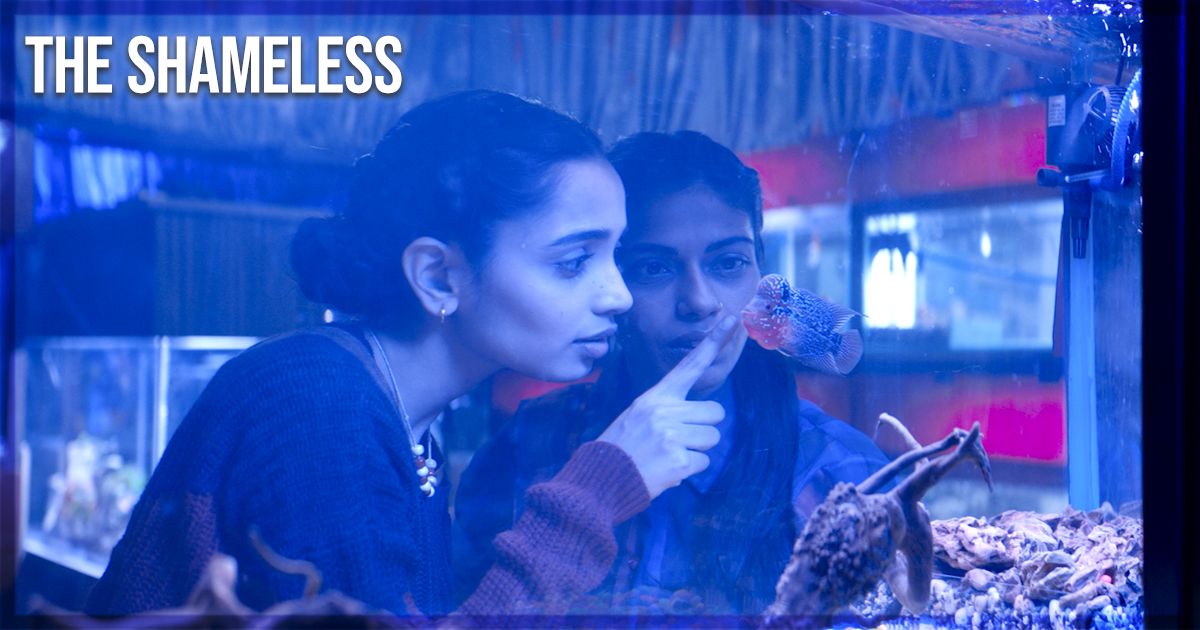Any description of The Shameless could make it sound like the most exploitative trash, so it’s stunning to realize that despite the grim setting, the exceptionally troubled characters, and the hopelessness of their situation, that it isn’t. This is a testament to the skill of writer-director (and Bulgarian-American) Konstantin Bojanov, the bravery of the lead actresses, and the entire cast and crew’s commitment to telling such a dark story with respect. It can be quite a difficult watch, and evidently, it was considered so tricky a concept that despite the Indian setting, it had to be filmed in Nepal. The Shameless is hardcore and not for the fainthearted, but it’s also an extremely good depiction of love being found in the most horrible circumstances, and the ways in which love can change your life, if not always for the better.
The story of The Shameless
It begins as Renuka (an astounding Anasuya Sengupta) is cleaning blood off her knife and her face, having just stabbed a man to death. Without pausing, she grabs up the cash in the room and walks out of the brothel where she works – worked – with only the clothes she’s wearing. She ‘convinces’ enough bus and taxi drivers to get her out of town and ends up in a remote northern city, where she’s informed women there dress modestly and don’t smoke in public.
By that evening, she’s found a new brothel, some clean clothes, and gotten back to work in time to see the madam of a house across the way sell her older daughter Mitali (Kiran Bhivagade) off to a brothel in a big city. That madam is Durwa (Auroshikha Dey), and she has another daughter in her late teens, Devika (Omara), who has not yet been sold because of her mental health problems. Devika occasionally has visions, is prone to self-harm, wants to be a rapper, and is also, though she hasn’t quite understood it yet, a lesbian.
Renuka is a lesbian, and the way in which the two women begin circling each other is surprisingly romantic. Of course, it’s not great even without the age gap; Renuka has had the hardest imaginable life while Devika is still fairly innocent, as her grandmother Isha (Mita Vashisht) has protected her and prevented Durwa from auctioning off her virginity. There are plenty of interested buyers, most notably wealthy scumbag Dinesh (Rohit Kokate), who, in the meantime, is making time with Renuka. When Renuka offers to take him to heaven, he replies he’d prefer to go to hell. Without missing a beat, she says that will cost him more.
Renuka has one resource in addition to her own body: her childhood friend Murad (Tanmay Dhanania), who keeps her appraised by phone on the manhunt out for her and is arranging for her to escape by being smuggled to the Philippines. When he tells her the cost (two lakhs, or about $2400), there’s a pause as she calculates how many dicks that means she has to suck. Mercifully, we do not learn the answer. There are no sex scenes, and even the violence is shot by Gabriel Lobos so that we don’t actually see anything, but the coarseness of the language throughout leaves nothing to the imagination.
Realistically, it couldn’t be anything else, of course, and the terrible scene at the end where Isha, Durwa, and Mitali argue is explicit at how deep the sexualized violence goes. And yet it’s being a lesbian that’s beyond the pale, as Durwa is the first among many to make viciously clear to Devika. Renuka is past caring, with such an air of danger about her – Robert DeNiro’s characters from Taxi Driver to Heat are a fair comparison – that it’s a surprise when a young man is dumb enough to insult her when she and Devika are out on a date.
Renuka handles him without blinking, of course. In Devika, Renuka has found the first true love in her life, and a relationship unsullied by the relentless demands of men. But she is under so much pressure and in so much pain that Devika’s love might not be enough. And unfortunately, things keep getting worse.
The audience around me at the Cannes Film Festival kept huffing in disbelief as the problems kept ratcheting up, but Ms. Sengupta’s astounding work as a woman determined to stay true to herself at whatever cost was enough to keep (almost) everyone riveted until the very end. Omara overdoes the wide-eyed schoolgirl bit at the beginning, but her coming-of-age is the movie’s vicious point, and once she settles down, it’s remarkably handled.
Final thoughts on The Shameless
Mr. Bojanov is interested in showing how these horrible cycles are perpetuated, and it’s no different to movies worldwide, which show how young men are violent lives from which they cannot escape. Except the difference is the bodies of those young men are used for hurting others, not for being hurt themselves, and it’s easier to accept a story where people at least have some agency over their own person. Women in Renuka and Devika’s lives have almost none, and their attempts to find it in each other only buy themselves the insult of the title. But if being called such a name is the price for happiness, that’s a price many women would happily pay.
The Shameless recently screened at the Cannes Film Festival.
You can learn more about the movie at the Cannes website for the title.


